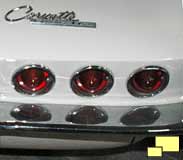Corvette Generations:
C1 C2 C3 C4 C5 C6 C7 C8
Corvette: Year by Year
1953 1954 1955 1956 1957 1958 1959 1960 1961 1962 19631964 1965 1966 1967 1968 1969 1970 1971 1972 1973 1974
1975 1976 1977 1978 1979 1980 1981 1982 1983 1984 1985
1986 1987 1988 1989 1990 1991 1992 1993 1994 1995 1996
1997 1998 1999 2000 2001 2002 2003 2004 2005 2006 2007
2008 2009 2010 2011 2012 2013 2014 2015 2016 2017 2018
2019 2020 2021 2022 2023 2024 2025

Classic Corvette Purchasing Tips
Part Three
If you're not the club joining type, change your ways, sign up and be active. A Corvette club can be your best resource. You can learn a lot with first hand and in person contacts, including Corvettes available for purchase, recommendations for vendors and repair shops and so on. Your author, for example, joined his local Vintage Corvettes of Southern California club. In addition to the fellowship of like minded Corvette freaks, many excellent resources in the form of parts sources, specialist contacts and other information that typically gets passed between owner / enthusiasts became available.
With the possible exception of Corvettes that have been recently restored by a qualified entity, almost all available classic Corvettes will, to some extent, have issues. If you won't consider anything with a tiny amount of dirt on it yet you are not willing to pay the top dollar that the best Corvettes can bring then your search may not come to a conclusion.
The market has a definite opinion here as only those Corvettes that can pass the "Is it correct?" test get the high dollars. Correct means that what is on the car is what was on it when it left the factory.
The term can be controversial as it is sometimes not clear what is "correct". There is also the "period correct" concept which refers to equipment on the car that was not produced by the factory but which was often added by owners at the time the car was new.
 Right: An example of an "incorrect" Corvette. Extra tail lights were added to this mid-year Corvette; four (two on each side) was how they were all built at the factory. This car would likely sell for less than a similar unmodified example. Other examples of "incorrect" status: changing the color of the car, installing a leather interior if not part of the original equipment, etc.
Right: An example of an "incorrect" Corvette. Extra tail lights were added to this mid-year Corvette; four (two on each side) was how they were all built at the factory. This car would likely sell for less than a similar unmodified example. Other examples of "incorrect" status: changing the color of the car, installing a leather interior if not part of the original equipment, etc.
Many early Corvettes had uneven panels with a fair amount of waviness especially in flat areas. That was the nature of fiberglass technology of the time. The question for the owner of a Corvette about to be painted is "Do the wavy panels stay or do they go?". Some may feel that the car looks better without the waves. But it would not to be correct.
Hopefully we have not been too negative in our coverage of a classic car purchase. This applies to your own search. When communicating with the seller, excessive pushiness or a demanding attitude can cause a seller to not want to deal with you. We may be used to beating on car salesmen like a rented mule, but that tactic can backfire when dealing with a private party. A seller who knows they have a good car may decide to ignore you if reasonable requests turn into big hassles. To put it another way, a seller trying to unload a car "with issues" might tolerate the mule beating in hopes of unloading their problem.
Sellers are human beings too and respond as such. If the seller has a nice car, tell them! If they are doing a good job in presenting their car and in helping you with your search, thanking them is appropriate. Many long lasting friendships started with the sale of a classic Corvette. You also may need to contact the seller as a resource after the car's purchase, so keeping the lines of communication open is a good idea.
Classic Corvette Purchasing Tips, Part One
Classic Corvette Purchasing Tips, Part Two
Classic Corvette Purchasing Tips, Part Five
Classic Corvette Purchase: Which one? (Part One)
Classic Corvette Purchase: Which one? (Part Two)


